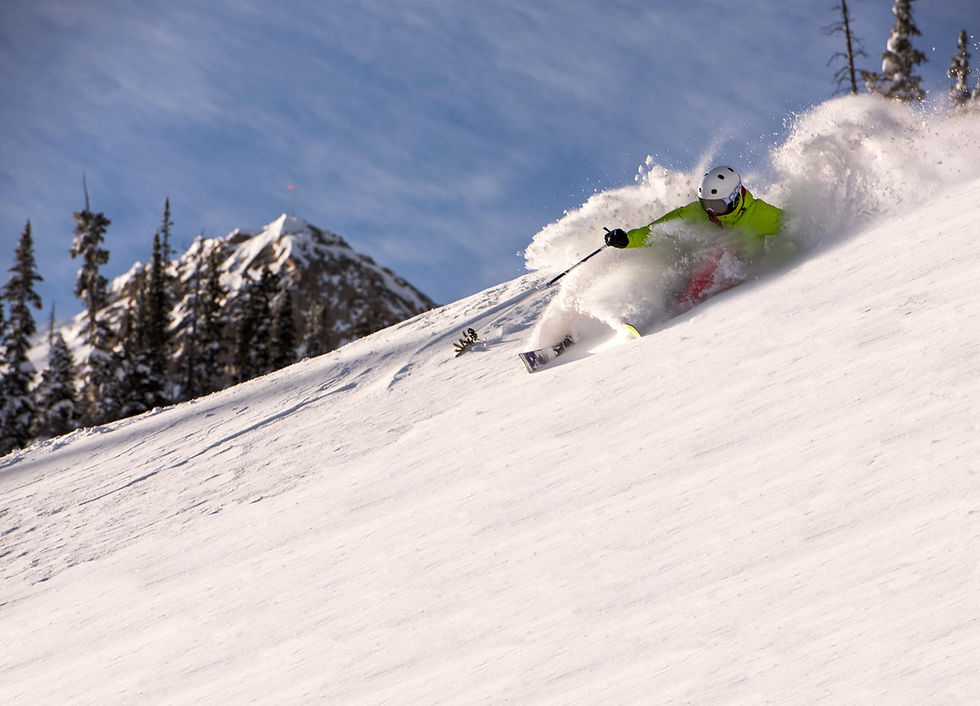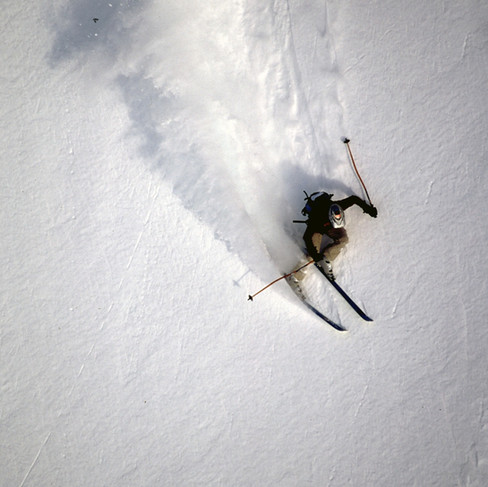Wendy Fisher on the Get Stoked Girls Podcast
- Rhianna Walzer
- Sep 11, 2025
- 9 min read
Updated: Oct 30, 2025
A conversation about facing fear, transitioning from racing to freeriding, honoring loss, embracing motherhood, and inspiring the next generation of women in the mountains.

Photo credit: Wendy Fisher, from her website.
Meet Wendy Fisher — Olympian, freeskiing champion, ski-film athlete, supermom, DJ, coach, and mentor.
Wendy's skiing career began early and fast. At just 14, she left home to attend Burke Mountain Academy, a small ski academy in northern Vermont. By 15, she had earned a spot on the U.S. Ski Team, racing in FIS World Cup events and ultimately competing in the 1992 Winter Olympics. Over the years, Wendy expanded her impact on the sport, competing in the X-Games and becoming a two-time World Extreme Skiing Champion. Beyond racing, some of her proudest moments came filming ski segments with top companies like Warren Miller, Matchstick Productions, and Switchback Entertainment, earning accolades including the Best Short award at the 2014 Powder Awards for her segment “Super Mom.”
Oh, and just to add one more accolade, Wendy was recently inducted into the 2025 Class of the Colorado Snowsports Hall of Fame!
In this conversation, Wendy opens up about her journey from Olympic ski racer to big mountain freerider, sharing the lessons, challenges, and triumphs that shaped her career. She reflects on growing up in a skiing family, coping with loss, and finding her own path in the mountains. Wendy dives into the adrenaline and fear of big mountain skiing, the mental and technical skills that carry over from racing, and the differences between competition and filming. She also discusses motherhood, how it transformed her perspective on skiing and life, and her commitment to giving back as a coach and mentor. Throughout, she shares her passion for empowering the next generation of female skiers, emphasizing confidence, professionalism, and showing up fully in the mountains.
Listen to this episode of Get Stoked Girls and get notified of new releases by subscribing on Spotify, Apple, YouTube or wherever you get your podcasts!
Early Years on the Mountain & Lessons in Loss
Rhi: When did skiing first come into your life, and what were those early years like?
Wendy: I grew up outside of Davis, California. My parents were recreational skiers who spent weekends driving to Tahoe, renting cabins, and taking us up to the mountains. My two older brothers joined the Squaw Valley ski team, and I followed. Even as a little kid, I wanted to be part of it all. My parents remember me lining up other kids’ ski boots when they came inside, completely absorbed in the scene. Skiing quickly became the center of our lives. When my oldest brother died in a ski accident, my parents could have pulled us away from the sport, but instead they chose to honor his love for skiing by keeping it part of our family. That decision shaped who I became.
I kept progressing, eventually attending Burke Mountain Academy in Vermont and earning a spot on the U.S. Ski Team. Racing gave me incredible opportunities, but the environment was difficult and left me feeling burned out. I loved skiing, but I did not love the racing world. By the time I left, I felt lost and unsure of what was next. Everything changed when I came to Crested Butte and entered a big mountain contest. Dropping into that venue reminded me why I loved skiing in the first place. The terrain, the adrenaline, and the energy from the crowd brought me back to life. That moment set me on a new path and opened the door to everything that followed.
Rhi: When you were racing, did skiing feel like a way to honor your brother, and how did your relationship with grief shape your approach to the sport?
Wendy: When I was younger, I had a lot of ups and downs thinking about death. In high school, living at an academy with seventy other kids and working so hard kept me distracted. But after graduation, when I traveled with a team and had more time to think, my brother’s death came back into focus. Another close friend of mine, who had been my roommate at school, also passed in a ski accident. That really hit me and made me realize I hadn’t been thinking about my brother enough. He was the reason I was here.
As I struggled in ski racing and lost my happiness in that environment, I would talk to him a lot, looking for some kind of energy or connection. But that also deepened my sadness. I started overtraining and restricting my eating, trying to control anything I could to feel better, but my body only became weaker. Traveling in an environment I wasn’t happy in made it worse. I overanalyzed why he had died and why I was here. Finding big mountain skiing was transformative. It didn’t stop me from thinking about my brother, but it sparked a new energy in my life and began a process of healing.
For a long time, I skied for him because he didn’t get to anymore. Now, I ski for myself, but I carry the connection to him with me.
From Gates to Peaks: Transitioning from Racing to Freeride
Rhi: Can you explain how racing and freeskiing differ?
Wendy: Alpine ski racing has different disciplines, ranging from technical to high-speed. I competed in giant slalom, downhill, and combined at the Olympics, gaining experience across both technical and speed events. Racing is all about memorizing every gate, turn, and rollover, and executing with precision and repetition.
Big mountain skiing is completely different. Competitions rope off a venue, and judges score you on things like technical skill, line choice, and fluidity. You rarely inspect the terrain up close, so you plan lines from a distance and memorize landmarks, like the big pine, pointy rocks, and drop-offs, before piecing it together on the fly. Mistakes require immediate problem-solving to descend safely. In many ways, I found big mountain skiing even more mentally demanding than racing.
Rhi: What skills or lessons from alpine ski racing were you able to carry into your big mountain skiing career?
Wendy: Ski racing gave me a really strong technical foundation, and that carried me through my professional freeride career. I remember standing at the top of a line, watching other skiers, and realizing how many of them lacked control or proper form. They were hanging on for dear life, in all these awkward positions. I knew that my technical background gave me an edge. Even though you lose composure in freeriding at times, you fight to get it back, and I felt confident knowing I had the skills to handle it.
When I started filming with Matchstick Productions, I leaned heavily on that technical foundation. Even though leaving ski racing was disheartening, I had worked hard, reached a high level, and built a skill set I could rely on. That’s what carried me into freeriding and made me proud of what I accomplished.
Rhi: Competing in freeride is so different from filming, even though in both cases you’re skiing a line for the first time. Can you talk about how the experience differed?
Wendy: Filming was nerve-wracking because you did not want to mess up. Often they did not want to repeat a line, so if you made a mistake, that run was gone. It was terrifying. Before a run, I would take a Polaroid of the mountain to help plan my line. I could study the photo to know when to turn, where rocks or obstacles were, and plan an exit strategy in case something went wrong. At the same time, I had to stay aware of snow conditions and potential avalanches.
Even with preparation, filming came with plenty of mishaps. One thing I told myself at the top of these lines was that the team respected my skiing. I was a strong technical skier, and if they could ski it, I could too. My ski racing background gave me the confidence to handle those high-stakes moments.
Rhi: Were you often the only woman on the crew, and what was it like being the girl in that environment?
Wendy: I loved it. I really thrived in that environment. Most of the time, I was the only woman on the crew. Everyone was supportive, respected my skills, and treated me equally. That energy pushed me and elevated my skiing. Watching those guys pick lines and ski at that level pushed me to work even harder. I’d think, “If they can ski that, I can ski that.”
I showed up, worked hard, and knew I deserved to be there.
Photo credit: Wendy Fisher, from her website.
The Mental Game of Skiing Big
Rhi: Can you walk us through what happens when you get dropped off? How do you manage the adrenaline and fear and actually go over the edge?
Wendy: At the end of every year, I’d think, “Why am I doing this? I’m done.” Then Matchstick would put the movie together, we’d go to the premieres, and everyone would cheer. That would suck me back in. I wanted to be the girl they called on, so that became my motivation. I did a lot of self-talk, reminding myself I deserved to be there, but I was scared every single run.
Skiing the line was exhilarating. After finishing, I’d feel amazing, thinking, “That was incredible.” Then you get back in the helicopter, everyone starts pointing at other peaks, asking for your opinion, and it hits again. Any negativity could mean they might not call you back. I’d say, “Yeah, looks great,” while thinking, “Oh my God, why do I do this?” I’ve eaten it, gone over bigger cliffs than planned, and made mistakes. The highs and lows take a real toll, but that’s part of what makes it so thrilling.
Photo credit: Wendy Fisher, from her website.
Supermom
Rhi: You’re a mom of two boys. How has becoming a mother changed the way you see yourself, both as a person and as a skier?
Wendy: Before I got pregnant, I was obsessed with working out. Anything less than a “hardcore” session made me anxious and depressed. I considered myself an athlete, and anything less felt like failure. Pregnancy forced me to slow down. I started walking more and realized that pause was actually very healing.
Having my first son shifted my perspective. I remembered feeling lost and frustrated in my younger years, and holding him helped me stop overthinking and refocus. With my second son, I realized I didn’t want to give up my passions. That mindset fueled “Super Mom.” Filming it, I had a gnarly crash on a line, which reminded me that being a parent doesn’t mean giving up. Pursuing what you love makes you a better parent and shows your kids the value of courage, passion, and commitment.
Rhi: What is one lesson motherhood has taught you about skiing?
Wendy: Oh, my God, patience. I feel for my kids because I was learning how to teach them and understand their bodies at the same time. I would get frustrated, thinking, come on, you can do this, but now I’ve learned to slow down and really be patient. Their little brains are still figuring out how to move and balance, and I’ve had to grow into that. Patience has been the biggest lesson.
Motherhood doesn’t end your identity as an athlete. It just adds another layer.
Still on the Mountain: Skiing, Coaching & Empowering Girls
Rhi: What is your relationship with skiing these days, and how are you currently involved in the sport?
Wendy: I teach private lessons now. I love skiing with people, helping them improve their technique, and building their confidence. I still do some camps or private client trips if I’m hired, but mostly I ski for myself.
What inspires me to give back is seeing people improve and helping them find confidence they might not get from other instructors. Skiing is a complicated sport. Unlike other sports, skiing has gravity pulling you down slopes while you’re trying to control everything, which makes it challenging. I want to give people tools and guidance so they can feel more confident, ski more fluidly, and enjoy it.
Rhi: As a pioneer for women in the sport and now as a coach and mentor, what are your hopes for the next generation of girls in skiing?
Wendy: It’s amazing to see how far girls’ skiing has come. The tricks and skills girls are pulling off now are on another level. Watching young girls, even in middle school, ski with the boys, challenge themselves on big lines, and push their limits is exactly what I loved doing as a kid. There were so few girls with that courage in my day, so it’s inspiring to see it growing.
For me, it’s simple. If you want to be included, show up and bring a positive attitude. The mountains don’t care about gender—they care about skill, focus, and professionalism. Girls deserve to take up space in skiing. You have to earn it, push yourself, and bring your best. That is what makes this sport so empowering, and that is the message I hope to pass on to the next generation.
The mountains don’t care if you’re a girl.
Photo credit: Wendy Fisher, from her website.
Get Stoked Girls
Rhi: What advice do you have to get girls stoked?
Wendy: Just say yes. I’ve been in so many new situations in my life, like when a friend asked me to DJ New Year’s. I had no idea how to DJ, but I said yes and figured it out. Or when a girlfriend invited me to climb Denali, I immediately said yes, even though I hate snow camping and cold.
I’ve learned that saying yes pushes you to grow. If someone else can do it, you can do it too. Saying yes helps you meet people, build community, and learn skills, especially in technical outdoor sports. It’s the first step to growing as a person and building self-esteem. You might fail, it might not go perfectly, but it’s another opportunity to learn. Even if things don’t go right, there’s always a lesson.



























